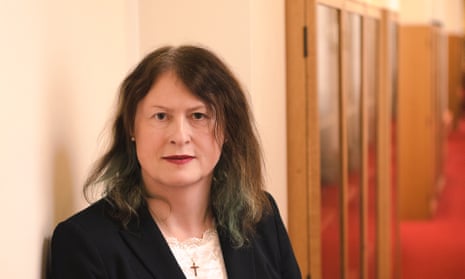The UK’s first transgender judge is seeking leave to join the litigation in a crucial supreme court case that could significantly affect legal protections for transgender women, the Guardian has learned.
Victoria McCloud, a senior civil judge who became the youngest person appointed as master of the high court in 2010, will make an application to intervene in the supreme court appeal brought by the campaign group For Women Scotland about the legal definition of “woman”. Interveners can put a case without being among the main parties to the litigation.
For Women Scotland is challenging whether Scottish government legislation aimed at improving gender balance on public boards should include transgender women.
The Gender Representation on Public Boards (Scotland) Act 2018 has been the subject of a long-running court action by the group, which most recently resulted in a ruling by Lady Haldane at the court of session that it was lawful to extend the definition of “woman” to transgender women with a gender recognition certificate.
McCloud, who transitioned in the late 1990s and subsequently changed her legal sex under the 2004 Gender Recognition Act, is supported in her application by the Good Law Project.
She is concerned about the effect of a successful appeal – which would affect the whole of the UK – on her legal recognition.
McCloud cannot speak directly to the media because of judicial constraints. A friend of hers said: “This would mean in practice that women like her [with a gender recognition certificate] would lose rights to equal pay with men and experience restricted rights to services or moves to exclude her from spaces such as women’s lavatories.”
The Guardian understands that if the For Women Scotland appeal succeeds, McCloud and her family have made provision to emigrate to an EU state where she would remain legally recognised as a woman.
Last month McCloud, 54, announced that she was resigning from the bench in April after 14 years as a full-time judge, citing the toxic climate towards transgender individuals in the UK.
In her resignation letter to the lady chief justice, president and vice-president of the king’s bench division, she wrote: “I have reached the conclusion that in 2024 the national situation and present judicial framework is no longer such that it is possible in a dignified way to be both ‘trans’ and a salaried, fairly prominent judge in the UK.”
According to For Women Scotland, which won an earlier judicial review of the act, the conflicting Scottish rulings “show that a definition of ‘sex’ that is inclusive of a person’s ‘acquired gender’ on a gender recognition certificate leaves the Equality Act opaque and unworkable for many women. There needs to be clarity that sex is a biological term.”
It argues that Haldane’s inclusive definition of “sex” leaves service providers of single-sex spaces “confused and … at risk of legal action for unlawful discrimination”.
Describing the case as “truly historic”, the author and campaigner JK Rowling has donated £70,000 to For Women Scotland’s crowdfunder for the action, which currently sits at nearly £150,000.
The executive director of the Good Law Project, Jo Maugham, said: “So many of these cases – about and with profound effects on the lives of trans people – are decided without any trans people in the room. Sometimes this happens because trans people can’t afford representation – they have no billionaire funders.
“Sometimes because it is said that trans people are self-interested – as though decisions about, say, black people should be made by white people. But however it happens it is not what justice looks like.”










